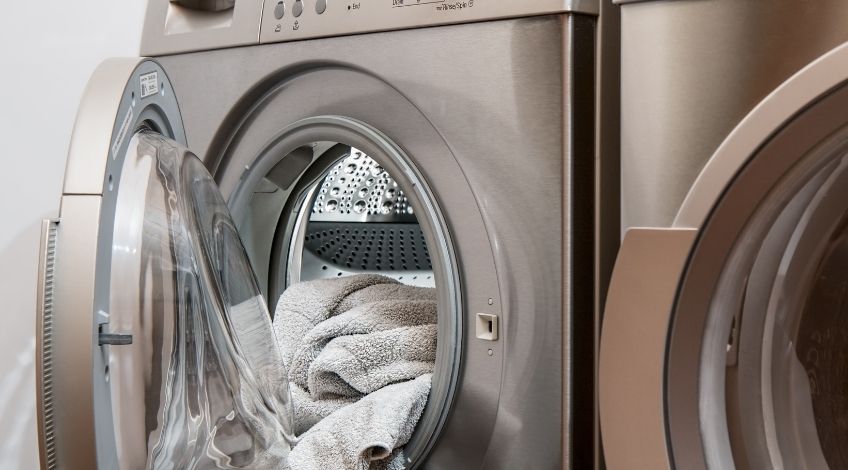
How Much Do Washing Machines Weigh? (in the UK)
If you’ve ever had to move a washing machine, you’ll know just how awkward and heavy they are. But do you know exactly how much weight you were shifting?
If the weight of your washing machine is interesting to you, keep reading. In this article we look at the weight of British washing machines as well as explaining why they’re so heavy and what affects that weight.
How Much Do British Washing Machines Weigh?
If you’re looking to buy a new washing machine, there are a number of things you’ll need to know. For instance, how much laundry it can hold (capacity) and if you’re going to need to transport it, you should also consider the actual weight of the appliance.
In fact the average weight for a washing machine in the UK is around 75 kg which is around 165 lbs. Top loaders tend to weigh less than front loaders with washer dryers falling somewhere in the middle.
| Type Of Washing Machine | Average Weight In kg |
|---|---|
| Front Loading Washing Machine | 80 kg |
| Washer/Dryer | 75 kg |
| Top Loading Washing Machine | 60 kg |
Please note: The values above represent the average weight of each type of washing machine. Other factors will affect the overall weight of the appliance.
The Capacity Of The Machine Affects Its Weight
Washing machines with a larger capacity tend to weigh more than those with a smaller capacity. For instance a washer with a 4 kg capacity can weigh only 50 kg. Whereas a 7 kg capacity washing machine could weigh as much as 90 kg.
Why Do Washing Machines Weigh So Much?

With the average washing machine weighing in at 75 kg, and some coming in at more than 90 kg, it leads to the question of why are they so heavy?
There are several reasons for the extreme weight of a washing machine which include;
Washing Machines Need A Sturdy Design
Washing machines have to withstand a lot of rough treatment and need to be able to handle large amounts of laundry. They also have to be able to spin at high speed to remove water from the laundry without falling to pieces.
Which means they need to be built from strong materials like cast iron and steel. Both of which add to the overall weight of the appliance.
Washing Machines Have Lots Of Internal Parts
To successfully wash your laundry, the washing machine needs a large wash tub, a motor, pump and pulleys etc. All of these internal components are necessary for your washer to work properly and they all add to the overall weight of the machine.
Washing Machines Need Stability
Washing machines, particularly front loaders, need to be well balanced to ensure they don’t tip over when in use. The same is true for top loaders to a certain degree, but front loaders would be more likely to fall over when spinning because they tend to be top heavy.
To counteract this imbalance, manufacturers add weight to the appliance to stop it from falling over even when it’s full of laundry and water.
That weight is made from concrete and weighs on average around 25 kg. That works out to the best part of a third of the overall weight of the appliance.
Due to the fast spin speeds achieved by modern washing machines, that extra weight is necessary to prevent the appliance from moving all around your kitchen or toppling over when in operation.
How Much Do Different Washing Machines Actually Weigh?
There can be a lot of variation between the weight of washing machines. Let’s look at some of the most popular front loading washers available on the UK market and compare their weights.
| Washing Machine Model | Weight & Info |
|---|---|
| LG TurboWash 360 with AI F4C510WBTN1 10 kg 1400 Spin Washing Machine | This LG turbowash 360 washing machine with a 10 kg capacity and a 1400 spin speed weighs 70 kg. |
| SAMSUNG Series 5+ AddWash WW90T554DAN/S1 WiFi-enabled 9 kg 1400 Spin Washing Machine | This 9 kg capacity washer from Samsung which also has a spin speed of 1400 rpm weighs 68 kg which is 2 kg less than the LG 10 kg capacity model above. Samsung also produces an 11 kg capacity version of this model which weighs 72 kg. |
| HOTPOINT NM11 846 WC A UK N 8 kg 1400 Spin Washing Machine | This Hotpoint model which has an 8 kg capacity as well as a 1400 spin speed weighs 68.8 kg which is slightly heavier than the Samsung 9 kg capacity washer. |
| BOSCH Series 6 WGG25402GB 10 kg 1400 Spin Washing Machine | This Bosch washing machine which has a 10 kg capacity and a 1400 spin speed weighs more than any of the others so far, coming in at 73.9 kg. |
| BEKO WTK72011W 7 kg 1200 Spin Washing Machine | This Beko washing machine with a 7 kg capacity and a 1200 spin speed weighs 67 kg. Even though this budget friendly machine can wash less laundry and has a slower spin speed, it still weighs around the same as all of the others. |
As you can see, there isn’t really too much difference between the weights of popular washing machines.
New Innovations In Washing Machine Design
As we move into the age of environmental awareness, scientists have turned their minds to that environmentally unfriendly concrete block and looked at ways to improve on the design.
A group of scientists from Nottingham Trent University have been looking at replacing the concrete block (which releases large amounts of CO2 during production) with a plastic counterweight.
This plastic container would be empty during the transport of the appliance and weigh less than 3 kg. Once the appliance is delivered to your home, the plastic tank is filled with water and sealed.
Obviously concrete is denser than water so the plastic container needs to be larger than the concrete block it’s replacing. The scientists are still fine tuning their designs.
But they estimate that swapping the concrete blocks for their plastic container could save somewhere in the region of 45,000 tonnes of CO2 every year and reduce transport fuel consumption by as much as 184,000 litres.

How To Safely Move A Washing Machine
If you are moving home and need to take your washing machine with you, here are a few tips on how to safely transport your appliance.
- Ensure The Washer Is Water Free
Before attempting to move your washing machine make sure it has been drained completely of water. There will always be a small amount of water remaining but every litre of water weighs one kilogram. So remove as much as possible to lighten your load. You should also ensure the water supply has been turned off and disconnected from the appliance. - Make Sure Everything Is Safe
Replace the transit bolts if you still have them, if not, pack the drum area with blankets to stop any movement during transit. Tape the wire and hoses to the appliance to prevent trip hazards and don’t lose the washer for the inlet hose. - Protect The Washer
Use blankets or bubble wrap to protect the machine from any scrapes or scratches when moving. - Use A Trolley To Move The Machine
As we’ve just discovered, washing machines weigh in excess of 50 to 90 kg, this is a lot of weight and can be impossible to control if it starts moving. Carrying the appliance by yourself is not an option. You will need a trolley of some sort to wheel the appliance from your old home to the removal van and then into your new home. - Don’t Do It Alone
Moving a washing machine is a two-man job and it’s even easier if those two men are removal men who do this sort of thing every day. If you’re using a removal company to move your furniture, add the washer to the inventory and get them to move it for you.
How Much Do Tumble Dryers Weigh?
On average, a tumble dryer weighs around half as much as a washing machine. Plastic tumble dryers weigh around 30 to 35 kg and stainless steel dryers weigh around 40 to 45 kg.
If you’re moving a tumble dryer as well, you should enlist the help of a friend or the removal company as it’s not so much the weight as the bulk that makes moving tumble dryers more difficult.
SEE ALSO: Can You Fit A Washing Machine In A Car? (What You Need to Know)
Frequently Asked Questions
The average weight of an 8 kg capacity washing machine is around 60 to 70 kg.
The average weight for washing machines depends on a number of factors, for instance the drum capacity can make a difference but as an average, front loaders weigh around 80 kg, top loaders weigh around 60 kg and washer dryers weigh around 75 kg.
It’s not a good idea to move a washing machine on your own. You should have at least two people to help lift and carry a washing machine. Aim to use a trolley with one person pushing the trolley and the other stabilising it.
Also, follow us on Pinterest ...



